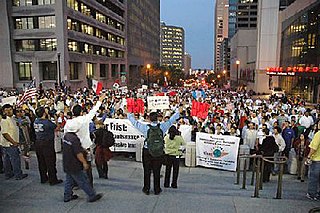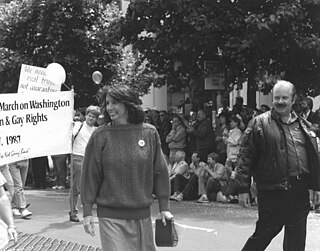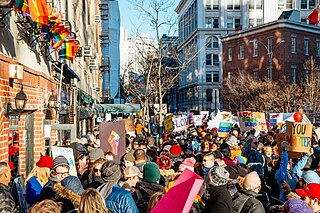Related Research Articles

Beginning in late 2002, and continuing after the 2003 invasion of Iraq, large-scale protests against the Iraq War were held in many cities worldwide, often coordinated to occur simultaneously around the world. After the biggest series of demonstrations, on February 15, 2003, New York Times writer Patrick Tyler claimed that they showed that there were two superpowers on the planet: the United States and worldwide public opinion.

The March on Washington for Jobs and Freedom, also known as simply the March on Washington or The Great March on Washington, was held in Washington, D.C., on Wednesday, August 28, 1963. The purpose of the march was to advocate for the civil and economic rights of African Americans. At the march, final speaker Dr. Martin Luther King Jr., standing in front of the Lincoln Memorial, delivered his historic "I Have a Dream" speech in which he called for an end to racism.

Act Now to Stop War and End Racism (ANSWER), also known as International A.N.S.W.E.R. and the ANSWER Coalition, is a United States–based protest umbrella group consisting of many antiwar and civil rights organizations. Formed in the wake of the September 11th attacks, ANSWER has since helped to organize many of the largest anti-war demonstrations in the United States, including demonstrations of hundreds of thousands against the Iraq War. The group has also organized activities around a variety of other issues, ranging from the Israel/Palestine debate to immigrant rights to Social Security to the extradition of Luis Posada Carriles.

Opposition to United States involvement in the Vietnam War began with demonstrations in 1964 against the escalating role of the United States in the Vietnam War and grew into a broad social movement over the ensuing several years. This movement informed and helped shape the vigorous and polarizing debate, primarily in the United States, during the second half of the 1960s and early 1970s on how to end the war.

The Moratorium to End the War in Vietnam was a massive demonstration and teach-in across the United States against the United States involvement in the Vietnam War. It took place on October 15, 1969, followed a month later, on November 15, 1969, by a large Moratorium March in Washington, D.C.

The proposed invasion of Afghanistan prompted protests with mass demonstrations in the days leading up to the war's official launch on October 7, 2001, the continuations of the war in Afghanistan has lead many to further protest and voice their opposition to hostilities.

The March for Life is an annual rally and march opposing both the practice and legality of abortion, held in Washington, D.C. on or around the anniversary of Roe v. Wade, a decision issued in 1973 by the United States Supreme Court legalizing abortion nationwide. The march advocates the overturning of Roe v. Wade and is a major gathering of the anti-abortion movement in the United States. It is organized by the March for Life Education and Defense Fund.

In 2006-2007, millions of people participated in protests over a proposed change to U.S. immigration policy. These large scale mobilizations are widely seen as a historic turn point in Latino politics, especially Latino immigrant civic participation and political influence, as noted in a range of scholarly publications in this field. The protests began in response to proposed legislation known as H.R. 4437, which would raise penalties for illegal immigration and classify illegal aliens and anyone who helped them enter or remain in the US as felons. As part of the wider immigration debate, most of the protests not only sought a rejection of this bill, but also a comprehensive reform of the country's immigration laws that included a path to citizenship for all illegal immigrants.

The March on Washington for Lesbian, Gay, and Bi Equal Rights and Liberation was a large political rally that took place in Washington, D.C. on April 25, 1993. Organizers estimated that 1,000,000 attended the March. The D.C. Police Department put the number between 800,000 and more than 1 million, making it one of the largest protests in American history. The National Park Service estimated attendance at 300,000, but their figure attracted so much negative attention that it shortly thereafter stopped issuing attendance estimates for similar events.

The Second National March on Washington for Lesbian and Gay Rights was a large political rally that took place in Washington, D.C., on October 11, 1987. Its success, size, scope, and historical importance have led to it being called, "The Great March". It marked the first national coverage of ACT UP, with AIDS activists prominent in the main march, as well as making headlines the next day during mass civil disobedience actions at the United States Supreme Court Building.
The March on Washington Movement (MOWM), 1941–1946, organized by activists A. Philip Randolph and Bayard Rustin was a tool designed to pressure the U.S. government into providing fair working opportunities for African Americans and desegregating the armed forces by threat of mass marches on Washington, D.C. during World War II. When President Roosevelt issued Executive Order 8802 in 1941, prohibiting discrimination in the defense industry under contract to federal agencies, Randolph and collaborators called-off the initial march.

The Women's Strike for Equality was a strike which took place in the United States on August 26, 1970. It celebrated the 50th anniversary of the passing of the Nineteenth Amendment, which effectively gave American women the right to vote. The rally was sponsored by the National Organization for Women (NOW). About 50,000 women gathered for the protest in New York City and even more throughout the country. At this time, the gathering was the largest on behalf of women in the United States. The strike, spearheaded by Betty Friedan, self-stated three primary goals: free abortion on demand, equal opportunity in the workforce, and free childcare. The strike also advocated for other second wave feminist goals more generally, such as political rights for women, and social equality in relationships such as marriage.

The Tea Party protests were a series of protests throughout the United States that began in early 2009. The protests were part of the larger political Tea Party movement. Most Tea Party activities have since been focused on opposing efforts of the Obama Administration, and on recruiting, nominating, and supporting candidates for state and national elections. The name "Tea Party" is a reference to the Boston Tea Party, whose principal aim was to protest taxation without representation. Tea Party protests evoked images, slogans and themes from the American Revolution, such as tri-corner hats and yellow Gadsden "Don't Tread on Me" flags. The letters T-E-A have been used by some protesters to form the backronym "Taxed Enough Already".

Protests against Donald Trump have occurred in the United States, Europe and elsewhere from his entry into the 2016 presidential campaign to his loss to Joe Biden in the 2020 presidential election. Protests have expressed opposition to Trump's campaign rhetoric, his electoral win, his inauguration, his alleged history of sexual misconduct and various presidential actions, most notably his aggressive family separation policy. Some protests have taken the form of walk-outs, business closures, and petitions as well as rallies, demonstrations, and marches. While most protests have been peaceful, actionable conduct such as vandalism and assaults on Trump supporters has occurred. Some protesters have been criminally charged with rioting. The largest organized protest against Trump was the day after his inauguration; millions protested on January 21, 2017, during the Women's March, with each individual city's protest taken into consideration, makes it the largest single-day protest in the history of the United States.

The Women's March was a worldwide protest on January 21, 2017, the day after the inauguration of Donald Trump as US president. It was prompted by several of Trump's statements being considered by many as anti-women or otherwise offensive to women. It was the largest single-day protest in U.S. history. The goal of the annual marches is to advocate legislation and policies regarding human rights and other issues, including women's rights, immigration reform, healthcare reform, disability justice, reproductive rights, the environment, LGBTQ rights, racial equality, freedom of religion, workers' rights and tolerance. According to organizers, the goal was to "send a bold message to our new administration on their first day in office, and to the world that women's rights are human rights".

"Not My Presidents Day" was a series of rallies against the president of the United States, Donald Trump, held on Washington's Birthday, February 20, 2017. Protests were held in dozens of cities throughout the United States. Demonstrations were also held outside London's Houses of Parliament.

There have been several protests organized by the LGBT community against the policies of United States President Donald Trump and his administration.

The 2018 Women's March was a global protest that occurred on January 20, 2018, on the anniversary of the 2017 Women's March.
Abortion in the District of Columbia is legal at all stages of pregnancy. 70% of adults said in a poll by the Pew Research Center that abortion should be legal in all or most cases. In 1971, in United States v. Vuitch, the US Supreme Court upheld a law saying abortion was allowed for "health" reasons which "psychological and physical well-being". Consequently, the District of Columbia became a destination for women seeking abortions starting that year.
References
- ↑ Laura Perdew Animal Rights Movement 2014- Page 65 "The 1990 March for the Animals was a milestone event showing how much the animal rights movement had grown. ... 1990, when an estimated 25,000 animal rights activists gathered in Washington, DC, for the March for the Animals."
- ↑ Animal Rights Activists March on Washington - AP Newsapnews "10 Jun 1990 — Organizers said ″March for the Animals″ - the first event of its kind - was a milestone in a movement they said was once viewed as outside ..."
- ↑ Helena Silverstein Unleashing Rights: Law, Meaning, and the Animal Rights Movement 1996 p35 "This gender disparity was apparent at the national March for the Animals, in June 1990, where the majority of marchers were women yet “Fewer than ten female activists were on the roster" (Animals' Agenda, September 1990, 39)."